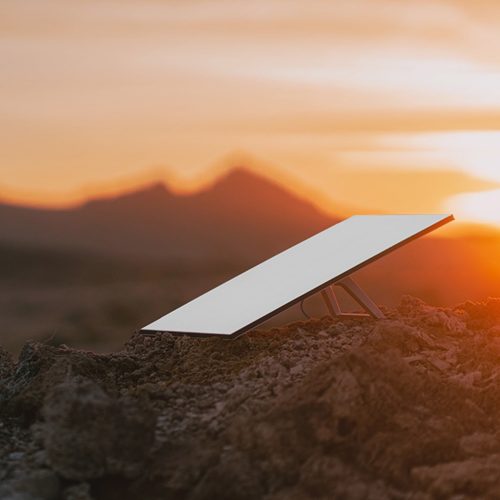SpaceX Tests Lower Satellite Orbits to Stop Starlink From Ruining Telescope Images
The company may have found a new way to keep its satellites from ruining telescope images.


Apu Gomes/Getty Images
Elon Musk says he will donate free Starlink terminals to Los Angeles as the city fights a series of devastating wildfires.
The SpaceX founder said on Wednesday night that the rocket company would provide the terminals to areas hit by the huge wildfires, which have forced 100,000 people to evacuate and plunged the region into chaos over the past few days.
"SpaceX will provide free Starlink terminals to affected areas in LA tomorrow morning," the billionaire wrote in a post on X.
SpaceX's Starlink service provides internet using a network of thousands of low-orbit satellites.
The technology is designed to offer connectivity in rural areas and regions without consistent internet access, and has been regularly deployed at natural disaster scenes in recent years.
Musk has also offered free Starlink services to areas hit by extreme weather events in the past.
In October, SpaceX waived costs to use the internet satellite service for those hit by hurricanes Milton and Helene, which battered the east coast of the US in late 2024 — although some users found that they still had to pay as much as $400 to purchase a Starlink terminal.
SpaceX has also deployed Starlink to war-torn regions such as Gaza and Ukraine, although not without political controversy.
Musk's announcement that SpaceX would supply Starlink to "internationally recognized aid organizations" in Gaza prompted fierce backlash from Israel, which had largely blocked communications from the territory since it launched a destructive invasion in the aftermath of attacks by Hamas in October 2023.
The company eventually received permission to set up the service in a hospital in Gaza, Musk confirmed in July last year.
Starlink's presence in Ukraine, where it has served as a key military communications tool for the Ukrainian army since 2022, has also dragged Musk into geopolitical minefields.
In 2023, the billionaire was heavily criticized for refusing a request from Ukrainian forces to enable Starlink over Crimea, foiling an attack on the Russian navy.
SpaceX did not respond to a request for comment, sent outside normal working hours.


The Italian government is considering the purchase of satellite Internet services from SpaceX's Starlink constellation, and the potential deal has triggered controversy along political, economic, and spaceflight lines in Europe.
The story was initially broken by Bloomberg on Sunday, which reported that Italy is in "advanced talks" with SpaceX to purchase $1.6 billion worth of secure telecommunication services from SpaceX. The publication said an agreement, for which talks began in mid-2023, had been stalled until Italian Prime Minister Giorgia Meloni visited President-elect Donald Trump in Florida recently.
This report set off a firestorm of responses that highlight the increasing sensitivity of European countries to partnering with SpaceX—the success of which has put serious pressure on Europe's launch industry—as well as the Trump administration and SpaceX founder Elon Musk.


© Alessia Pierdomenico/Bloomberg via Getty Images

Taylor Rains/Business Insider
United Airlines is one step closer to bringing free WiFi to its planes.
The Chicago-based carrier announced plans in January to test Elon Musk's high-speed Starlink internet on an Embraer 175 regional jet in February.
By year-end, United's entire two-cabin regional fleet, meaning its smaller planes with first and economy class, will get the upgrade. Its first mainline aircraft will also take off by the end of 2025, with the entire fleet getting the upgrade at some point.
Members of United's MileagePlus loyalty program will be able to access Starlink for free, including for browsing and streaming.
Members currently pay $8 for internet on domestic and short-haul international flights, while non-members by $10. International WiFi pricing depends on destination and flight length.
United's new free internet access will join Delta Air Lines and JetBlue Airways, both of which already provide complimentary WiFi through other providers like ViaSat and Gogo
American Airlines has free ad-sponsored internet on certain narrow-body planes, but it's limited to 20 or 30 minutes.
Starlink, an arm of SpaceX, provides WiFi via low-orbit satellites. Its reliability is particularly useful in remote areas and on cruise ships, and its popularity has grown on commercial airplanes.
Viasat, by comparison, has only a few satellites and is slower by comparison.
In 2022, semi-private air carrier JSX was the first company to ink a deal for Starlink. The company has since deployed the service on its entire fleet of Embraer jets.
Hawaiian Airlines, now merged with Alaska Airlines, has retrofitted its Airbus A330 and A321neo planes with free Starlink and has plans to add its Boeing 787s, too.
Alaska has since acquired Hawaiian's Starlink-equipped jets. Starting this year, it plans to fly the widebody Airbus aircraft from Seattle to Japan and South Korea.
AirBaltic, Air France, Air New Zealand, Qatar Airways, and Japan's Zipair have also selected Starlink for their fleets.

Pete Syme/Business Insider
Qatar rolled out free Starlink on its first Boeing 777 in October. It plans to install the service on the entire 777 fleet by the end of 2025 and start the upgrades on its Airbus A350s this summer.
Business Insider tested Qatar's new WiFi at 36,000 feet and found a download speed of up to 215 megabits per second, though it dipped over certain areas.
The service could easily manage high-speed streaming and video calling with little to no buffering.
A few months ago, United Airlines announced its deal with Starlink to offer in-flight internet access for its passengers. At the time, the airline said it would start testing the new service in early 2024 and then offer it on passenger flights later in the year. United has now accelerated this timeline a bit, with […]
© 2024 TechCrunch. All rights reserved. For personal use only.
SpaceX is significantly upping the ante of its Starship test flight program, with the next rocket launch expected to demonstrate payload deployment for the first time. The payload in question will be 10 Starlink “simulators” that will be similar in size and weight to the next-gen satellites SpaceX plans to use Starship to deploy in […]
© 2024 TechCrunch. All rights reserved. For personal use only.

NurPhoto/NurPhoto via Getty Images
Elon Musk's Starlink has signed a deal with Ukraine's largest telecoms operator to provide consumers in the country with "uninterrupted" satellite-powered mobile connectivity.
The deal is set to give Kyivstar customers the ability to send text messages even if the terrestrial network is down, the company said on Monday.
Starlink's "Direct to Cell" service is expected to come online in the fourth quarter of 2025, with voice and data transmission services coming later.
Kyivstar said Ukraine would become one of the first countries to deploy the service, which can be accessed on phones without any additional hardware or software, so long as they have 4G LTE capabilities.
Starlink, a subsidiary of SpaceX, has sent thousands of Starlink kits to Ukraine since Russia invaded the country in February 2022. These have come in the form of portable terminals that receive broadband connections directly from Starlink's constellation of satellites, rather than a mass-consumer network rollout.
Ukraine's military has been using Starlink terminals for internet connectivity in remote locations, making the service an important frontline resource.
Since invading nearly three years ago, Russia has consistently attacked Ukraine's infrastructure, including a drone and missile strike on its energy infrastructure on Christmas Day.
Kaan Terzioglu, the CEO of Veon Group, Kyivstar's parent company, said in an announcement that the Starlink deal would "significantly increase the resilience of our services thanks to satellite technologies" for its more than 23 million mobile subscribers.
SpaceX completed its first constellation of Starlink direct-to-cell satellites during a Falcon 9 rocket launch in early December.
The company has struck deals with telecom companies elsewhere around the world for the direct-to-cell service, including T-Mobile in the US, and partnered with airlines to offer free WiFi on flights.
Global internet traffic from Starlink more than tripled in 2024, according to data from IT service provider Cloudflare


LEON NEAL/POOL/AFP via Getty Images
Elon Musk's Starlink could have a new rival after the European Union confirmed it will join the race to provide high-speed internet to remote locations.
The EU said Monday it had finalized plans to build a €10.6 billion ($11.1 billion) satellite network that will take on SpaceX's Starlink. The bloc said the Iris² satellite constellation will include 290 satellites in low and medium-Earth orbit, with the service expected to be up and running by 2030.
European politicians have previously expressed concerns about the dangers of becoming overly reliant on Starlink.
SpaceX's satellite internet service has around 7,000 satellites in orbit, according to expert estimates, and has seen traffic surge in recent years as it has expanded its operations to over 100 countries.
Starlink has also played a vital role in the war in Ukraine, with Ukrainian military forces relying on the service for military communications.
That reliance has caused tensions with SpaceX's billionaire owner. In September 2023, Musk said he had denied a request to activate Starlink in Crimea, thwarting an attack on Russia's Black Sea fleet.
Musk has also frequently clashed with European regulators, who have launched proceedings against his social media platform, X, over the platform's blue checkmark system, which the EU says is misleading.
Europe has also been trying to cut its dependence on SpaceX's rockets with the Ariane 6, a reusable rocket that rivals SpaceX's Falcon 9 and had a successful first flight in July.
The EU is not the only one building their own Starlink rival. Amazon is working on its own network of internet-providing satellites, called Project Kuiper, with the first satellites expected to be deployed next year.


T-Mobile today said it opened registration for the "T-Mobile Starlink" beta service that will enable text messaging via satellites in dead zones not covered by cell towers.
T-Mobile's announcement said the service using Starlink's low-Earth orbit satellites will "provid[e] coverage for the 500,000 square miles of land in the United States not covered by earth-bound cell towers." Starlink parent SpaceX has so far launched over 300 satellites with direct-to-cell capabilities, T-Mobile noted.
A registration page says, "We expect the beta to begin in early 2025, starting with texting and expanding to data and voice over time. The beta is open to all T-Mobile postpaid customers for free, but capacity is limited."


© T-Mobile
The European Union is forging ahead with plans for a constellation of internet satellites to rival Elon Musk-owned Starlink, after signing a €10.6 billion ($11.1 billion) deal to launch nearly 300 satellites into low- and medium-Earth orbits by 2030. The bloc wants the space tech to boost its digital sovereignty by providing secure comms to […]
© 2024 TechCrunch. All rights reserved. For personal use only.

In recent days, there has been a smattering of coverage in state-run Russian media outlets about how the Belarusian army has developed its own satellite Internet service akin to SpaceX's Starlink constellation, called "Kulisa."
According to the TASS news service, for example, the Kulisa mobile communications technology has "already entered service and is being used in military units of the Armed Forces."
And Pravda, which started out as the official newspaper of Russia's Communist Party more than a century ago, taunted the developer of the technology, saying, "How's that for you, SpaceX?"


© Pravda

Starlink
Elon Musk's Starlink is taking over planes and cruise ships, and traffic is booming as a result.
Global internet traffic from SpaceX's satellite internet service more than tripled in 2024, according to data from IT service provider Cloudflare.
Starlink, which uses a network of thousands of low-orbit satellites to provide high-speed internet to areas with limited web access, has expanded rapidly over the past year.
The service has launched in a host of new countries, including Chad, Mongolia, and Argentina, and has also become increasingly visible on planes and cruises.
United Airlines announced in September it had struck a deal to begin offering free WiFi using Starlink on all its flights from next year after Hawaiian Airlines began offering free Starlink access earlier in 2024.
Qatar Airways also launched its Starlink service, which Business Insider's Pete Syme found offered impressively quick internet speeds when he tested it in October.
Several major cruise companies have begun offering Starlink on their ships, with Carnival Cruises announcing in May that all of its cruise liners are now equipped with Starlink.
SpaceX also launched a laptop-sized version of Starlink's satellite dish called Starlink Mini in June, with the company offering a mobile "Roam" package for RV users and van-life enthusiasts.
Cloudflare said Starlink has seen rapid growth in areas with "pent-up demand" for alternative internet services. Traffic in Georgia and Paraguay, where Starlink launched in November and December 2023, has increased by 100 and 900 times this year, respectively.
It marks a second consecutive year of rapid growth for Starlink. It also almost tripled traffic in 2023.
Starlink has become a key part of SpaceX's business, though it has occasionally entangled the rocket company and Elon Musk in political controversy.
SpaceX is reportedly in talks to sell shares in a deal that would value the NASA contractor at around $350 billion. This would make SpaceX one of the most valuable private companies on the planet and double its $175 billion valuation at the end of 2023.


Alan Dyer/Stocktrek Images/ Getty Images
SpaceX's Starlink and other mega-constellations of satellites could damage the atmosphere in ways we don't yet understand, scientists say.
The number of satellites in Earth's orbit has skyrocketed from about 1,000 in 2010 to more than 10,000 today. According to a government report, an additional 58,000 satellites could launch by 2030, largely from SpaceX, OneWeb, Amazon, and the Chinese government — all to connect the entire planet to the internet.
Research suggests the ozone layer that protects us from powerful solar radiation could be at stake.
About 100 scientists signed a letter in October asking the Federal Communications Commission, which regulates satellite launches in the US, to pause mega-constellations.
"We should look before we leap," the letter reads, adding, "The environmental harms of launching and burning up so many satellites aren't clear."
Elon Musk — who sits at the helm of the world's dominant satellite constellation, Starlink — has publicly criticized some regulations affecting his companies and has positioned himself to push against regulation with the new Trump administration.
Starlink accounts for more than half of the 10,560 active satellites as of November 15, according to tracking by the Harvard astronomer Jonathan McDowell. SpaceX has filed for permission to fly 30,000 more satellites.

Brandon Bell/Getty Images
SpaceX did not respond to a request for comment.
Studies have found that rocket launches, such as those that put satellites into space, emit pollutants like carbon dioxide and black carbon, which could trigger processes that deplete Earth's protective ozone layer.
That's just the launch. Most satellites eventually fall out of orbit because of malfunction or because they're reaching the end of their lives. This "reentry" prevents dead satellites from becoming dangerous, uncontrollable space junk, but it also causes them to burn up as they plow through the atmosphere, releasing metals like aluminum.
Due to the sheer number of satellites expected to fly, die, and re-enter in coming years, future mega-constellations could inject 21 times more aluminum oxides into the upper atmosphere than 2022 rates, according to a paper published in the Geophysical Research Letters in June.
Aluminum oxides can linger for decades and cause "significant ozone depletion," the researchers wrote.
There may also be impacts scientists have not yet discovered — "unknown unknowns," Nilton Renno, an atmospheric scientist who co-signed the letter, told BI.

Paul Hennessy/SOPA Images/LightRocket via Getty Images
An accurate prediction of all possible impacts "should be the basis for any relevant policy," Joseph Wang, a coauthor of the aluminum-oxides paper and a professor of aerospace and mechanical engineering at the University of Southern California, told BI in an email. At the moment, no such prediction exists.
For now, satellites are small potatoes compared to pollution from other industries. It's unclear how quickly their impact will balloon.
Another study found that about 10% of aerosol particles in the stratosphere contain metals from satellites and other spacecraft, and that amount could increase to about 50% in the next few decades.
The 100-scientist letter asks the FCC to pause new satellite launches, conduct environmental reviews under the National Environmental Policy Act (NEPA), and end a rule that excludes satellites from those review requirements.
The letter says the exclusion "offends common sense," given the number of satellites in play.
In a 2022 report, the US Government Accountability Office also recommended that the FCC reassess the exclusion.
Indeed, an FCC spokesperson told BI that the agency plans to review its NEPA rules, which would include the satellite exclusion. That's because the Council on Environmental Quality updated government-wide regulations for implementing NEPA in May.
If the FCC finds that large satellite constellations significantly affect the human environment (such as Earth's atmosphere), it may have to start requiring environmental reviews.
Michelle Hanlon, the executive director of the Center for Air and Space Law at the University of Mississippi School of Law, agrees that more studies are needed but doesn't think that stopping satellite launches should be the solution.
"We can shut down the American space industry and there's still going to be launches," she told BI.
The incoming Trump administration may not be the most environmental-review-friendly, given Musk's anticipated role in it.
"There is a lot of waste and needless regulation in government that needs to go," Musk wrote on X after Trump announced a plan for the billionaire CEO to lead a new Department of Government Efficiency.
Musk and SpaceX have already clashed with regulators over environmental reviews. In September the company published a strongly worded statement about the Federal Aviation Administration's review requirements for operations in Texas, where its next-generation Starship rocket is based.
Then, in October, SpaceX sued the California Coastal Commission, an environmental regulator, after it blocked the company's request for additional launches. SpaceX alleged the commission had made the decision based on political bias.
Without an environmental review, it's unclear what the impact of SpaceX's Starlink plans will be.


Starlink yesterday obtained federal approval to provide service to cell phones, with some limits. The Federal Communications Commission issued an order that partially grants SpaceX's application while imposing conditions and deferring a decision on some aspects of the application.
Starlink received approval to provide Supplemental Coverage from Space (SCS) within the United States. This means that in areas not covered by terrestrial cellular networks, Starlink satellites can provide service to cell phones. SpaceX already had approval to launch 7,500 second-generation satellites for its existing broadband service, and the new approval allows mobile service from those satellites.
The approval lets Starlink and T-Mobile move ahead with their plan to provide satellite service to phones in cellular dead spots. SpaceX is authorized to use the 1910–1915 MHz (Earth-to-space) and 1990–1995 MHz (space-to-Earth) bands for SCS pursuant to its lease agreement with T-Mobile. The lease covers the continental US, Alaska, Hawaii, and Puerto Rico.


© SpaceX
The FCC has granted SpaceX permission to go forward with plans to offer a direct-to-phone version of its Starlink satellite internet service, with T-Mobile as its provider and a few provisos in place. The proposal dates to summer 2022, when SpaceX and T-Mobile first announced that they were pursuing the ability for the mobile provider’s […]
© 2024 TechCrunch. All rights reserved. For personal use only.

The Starlink waitlist is back in certain parts of the US, including several large cities on the West Coast and in Texas. The Starlink availability map says the service is sold out in and around Seattle and Spokane, Washington; Portland, Oregon; San Diego; Sacramento, California; and Austin, Texas. Neighboring cities and towns are included in the sold-out zones.
There are additional sold-out areas in small parts of Colorado, Montana, and North Carolina. As PCMag noted yesterday, the change comes about a year after Starlink added capacity and removed its waitlist throughout the US.
Elsewhere in North America, there are some sold-out areas in Canada and Mexico. Across the Atlantic, Starlink is sold out in London and neighboring cities. Starlink is not yet available in most of Africa, and some of the areas where it is available are sold out.


© Starlink